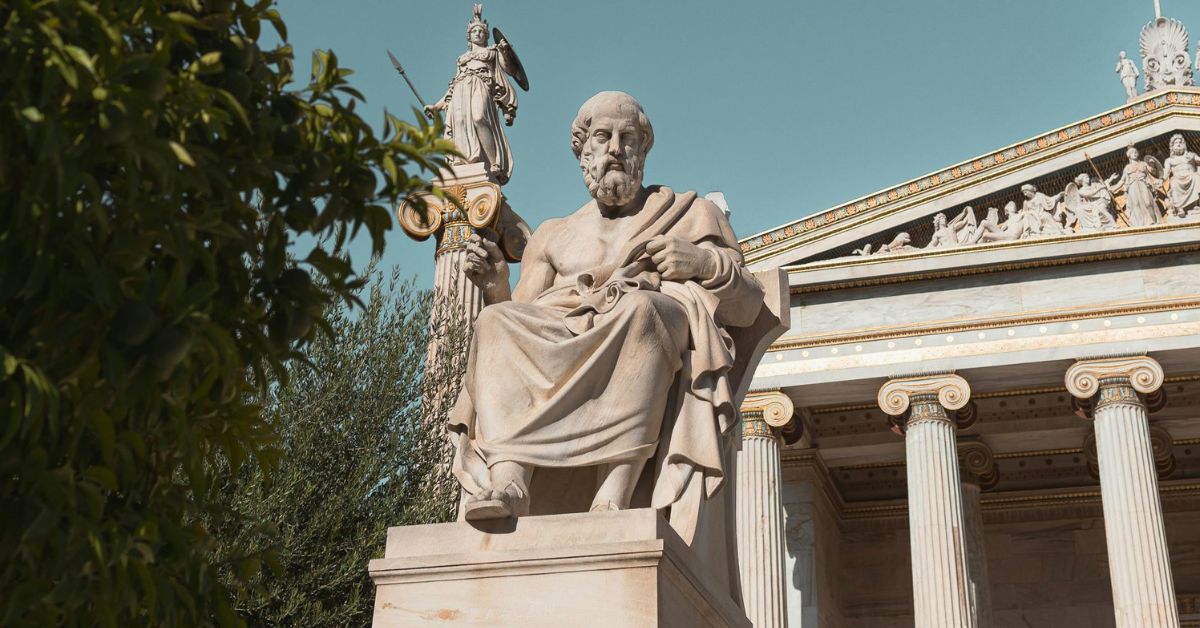
Socrates’ Legacy: Why Asking Questions Still Matters
Outline:
- The Man Who Knew He Knew Nothing
- The Power of the Question
- Socratic Dialogue: Thinking as an Act of Courage
- Modern Echoes: The Question in a Distracted Age
- Asking Better Questions: A Practice for Daily Wisdom
- To Question Is to Care
- FAQs
The Man Who Knew He Knew Nothing
In the crowded marketplace of ancient Athens, among traders, soldiers, and statesmen, stood a man who changed the world without writing a single word. Socrates asked questions—questions that unsettled the powerful, stirred the young, and shaped the future of philosophy. He claimed to possess no wisdom, only the awareness of his ignorance. Yet in that very admission, he became one of the wisest minds history has ever known.
Socrates did not offer easy answers. He offered presence. Listening, prodding, and exposing contradictions, he made people think in ways they never had before. And in doing so, he left behind more than a method—he left behind a mindset.
Today, thousands of years later, his questions still echo. In classrooms, in therapy rooms, in moments of honest self-reflection, they persist. Why? Because at the heart of human growth is not certainty—but curiosity.
The Power of the Question
A good question can feel like a spotlight—suddenly illuminating something hidden in plain sight. Socrates knew this. He believed that truth wasn’t something to be handed down from authority, but something to be drawn out of dialogue. The word educate itself comes from the Latin educere, meaning “to draw out.”
Socrates’ questions weren’t passive. They disrupted comfort. When he asked, “What is justice?” or “What is courage?” he forced his listeners to move beyond slogans and examine their deepest assumptions.
Modern psychology supports this ancient wisdom. Research shows that metacognition—the ability to think about our thinking—enhances problem-solving and emotional intelligence. And the gateway to metacognition? Thoughtful questions.
We often believe what we think simply because we think it. But questions create distance. They open up space between thought and truth. They allow us to observe our beliefs, rather than become them.
Socratic Dialogue: Thinking as an Act of Courage
The Socratic method is more than a style of teaching—it’s a way of being. In these dialogues, Socrates played the role of a gadfly: irritating, persistent, refusing to let comfort or convention go unchallenged. His questions weren’t attacks. They were invitations—to think, to clarify, to evolve.
This kind of thinking demands courage. It means letting go of the need to be right. It means standing in uncertainty long enough for something deeper to emerge.
In a culture obsessed with having answers, the Socratic way feels radical. We are praised for confidence, rewarded for speed, and trained to react. But wisdom grows in slowness—in sitting with not knowing, and continuing to ask anyway.
Modern Echoes: The Question in a Distracted Age
We live in an age of instant information and automated answers. But information is not insight, and scrolling is not thinking. We carry powerful tools in our pockets, but without thoughtful inquiry, those tools only reinforce what we already believe.
Algorithms feed us what we want to see. Echo chambers reward certainty. Yet the Socratic spirit challenges us to remain open, especially when it’s uncomfortable.
In journalism, in science, in therapy, in leadership—asking the right question is often more powerful than giving the right answer. In business, the question “Why are we doing it this way?” can spark innovation. In relationships, “How are you really feeling?” can open emotional doors long shut.
And in our inner world, the question “What am I avoiding?” can become the beginning of healing.
Asking Better Questions: A Practice for Daily Wisdom
So how do we bring Socrates into our lives today—not as a statue, but as a guide?
- Ask why, five times. This simple technique, used in systems thinking, helps uncover root causes instead of stopping at surface symptoms. Why am I anxious? Why does that matter? Why do I respond this way?
- Challenge your own beliefs. What do I assume to be true—and how do I know? Who taught me this? Could the opposite also be true?
- Listen more than you speak. Socrates wasn’t a lecturer; he was a listener. He created space for others to think out loud. In conversations, practice asking more than telling.
- Stay with the discomfort. A question that matters often makes us uncomfortable. That’s a sign you’re getting close to something meaningful.
Questions, like seeds, don’t bloom overnight. But planted with intention, they grow into clarity, into humility, and eventually—into wisdom.
To Question Is to Care
Socrates was sentenced to death for corrupting the youth of Athens—not by violence or rebellion, but by teaching them to question what they’d always been told. His trial, and his unwavering integrity in the face of it, remind us that questioning is not just a mental act—it is a moral one.
To ask a real question is to care. About truth. About others. About the future.
In a world quick to speak and slow to think, to live like Socrates is to live counter to the current. But it is precisely that current we must examine. Not to resist blindly—but to understand deeply.
Let us not be mere carriers of opinions. Let us become cultivators of thought. The Socratic legacy isn’t about answers. It’s about having the courage to live the question.
FAQs
Why was Socrates so focused on asking questions instead of giving answers?
Socrates believed that wisdom begins with recognizing one’s own ignorance. He asked questions to help others uncover their assumptions and arrive at deeper understanding through dialogue.
How is the Socratic method used today?
It’s used in education, therapy, law, and leadership training. The method encourages critical thinking by prompting individuals to explain and reflect, rather than memorize or comply.
Can questioning everything lead to confusion or paralysis?
Not necessarily. The goal is not endless doubt, but thoughtful clarity. Questioning helps refine what truly matters, separating inherited assumptions from deeply held truths. It’s a process of sharpening, not erasing.
The Socratic method is more than a style of teaching—it’s a way of being. In these dialogues, Socrates played the role of a gadfly: irritating, persistent, refusing to let comfort or convention go unchallenged. His questions weren’t attacks. They were invitations—to think, to clarify, to evolve.
This kind of thinking demands courage. It means letting go of the need to be right. It means standing in uncertainty long enough for something deeper to emerge.
In a culture obsessed with having answers, the Socratic way feels radical. We are praised for confidence, rewarded for speed, and trained to react. But wisdom grows in slowness—in sitting with not knowing, and continuing to ask anyway.
Modern Echoes: The Question in a Distracted Age
We live in an age of instant information and automated answers. But information is not insight, and scrolling is not thinking. We carry powerful tools in our pockets, but without thoughtful inquiry, those tools only reinforce what we already believe.
Algorithms feed us what we want to see. Echo chambers reward certainty. Yet the Socratic spirit challenges us to remain open, especially when it’s uncomfortable.
In journalism, in science, in therapy, in leadership—asking the right question is often more powerful than giving the right answer. In business, the question “Why are we doing it this way?” can spark innovation. In relationships, “How are you really feeling?” can open emotional doors long shut.
And in our inner world, the question “What am I avoiding?” can become the beginning of healing.
Asking Better Questions: A Practice for Daily Wisdom
So how do we bring Socrates into our lives today—not as a statue, but as a guide?
- Ask why, five times. This simple technique, used in systems thinking, helps uncover root causes instead of stopping at surface symptoms. Why am I anxious? Why does that matter? Why do I respond this way?
- Challenge your own beliefs. What do I assume to be true—and how do I know? Who taught me this? Could the opposite also be true?
- Listen more than you speak. Socrates wasn’t a lecturer; he was a listener. He created space for others to think out loud. In conversations, practice asking more than telling.
- Stay with the discomfort. A question that matters often makes us uncomfortable. That’s a sign you’re getting close to something meaningful.
Questions, like seeds, don’t bloom overnight. But planted with intention, they grow into clarity, into humility, and eventually—into wisdom.
To Question Is to Care
Socrates was sentenced to death for corrupting the youth of Athens—not by violence or rebellion, but by teaching them to question what they’d always been told. His trial, and his unwavering integrity in the face of it, remind us that questioning is not just a mental act—it is a moral one.
To ask a real question is to care. About truth. About others. About the future.
In a world quick to speak and slow to think, to live like Socrates is to live counter to the current. But it is precisely that current we must examine. Not to resist blindly—but to understand deeply.
Let us not be mere carriers of opinions. Let us become cultivators of thought. The Socratic legacy isn’t about answers. It’s about having the courage to live the question.
FAQs
Why was Socrates so focused on asking questions instead of giving answers?
Socrates believed that wisdom begins with recognizing one’s own ignorance. He asked questions to help others uncover their assumptions and arrive at deeper understanding through dialogue.
How is the Socratic method used today?
It’s used in education, therapy, law, and leadership training. The method encourages critical thinking by prompting individuals to explain and reflect, rather than memorize or comply.
Can questioning everything lead to confusion or paralysis?
Not necessarily. The goal is not endless doubt, but thoughtful clarity. Questioning helps refine what truly matters, separating inherited assumptions from deeply held truths. It’s a process of sharpening, not erasing.


